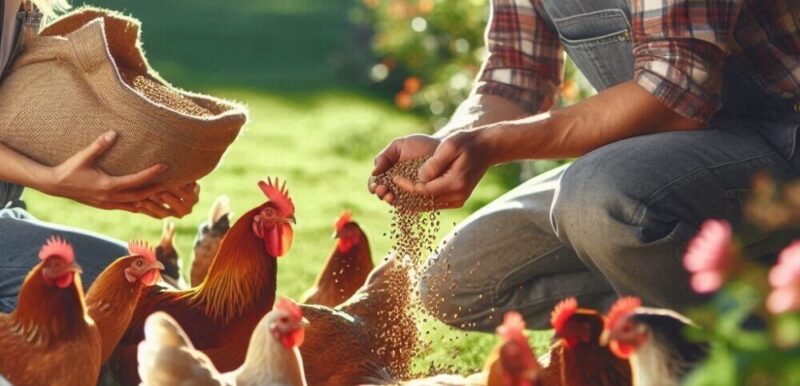
Egg quality is a hot topic in chicken-keeping circles. It is in mine, that’s for sure. I give away a lot of eggs, and the response is always very positive.
A friend recently went on a round-the-country trip in her “van,” and she said one of the challenges of her journey was trying to find fresh eggs. Sound silly? Not when you’ve gotten used to having your eggs less than a week old.
It’s not just about how many eggs your hens lay but also how good those eggs are. Believe me, what you feed your chickens can make all the difference. It’s like how what we eat affects our health and energy levels—the same for our little egg-makers.
First, let’s discuss the direct impact of diet on egg quality.
Chickens need a balanced diet of proteins, fats, vitamins, and minerals.
Just like a balanced diet keeps us in tip-top shape, a balanced chicken diet ensures strong, healthy eggs. The right feed can even influence the taste and texture of the eggs, making your morning omelet that much better.
Why should we care about egg yolk color? Well, it’s not just for aesthetics. Darker yolks indicate a higher nutrient content, like more omega-3 fatty acids and vitamins A and E.
These nutrients are super beneficial, not just for eating the eggs but also for the hens producing them. Healthier hens lay better eggs—simple as that.
Understanding the nutritional needs of laying hens is crucial. These birds need a good mix of proteins for muscle and feather growth, calcium for strong eggshells, and other vitamins and minerals for overall health.
Common feed ingredients include grains, seeds, and greens. However, supplements like Kicken Chicken for vitamin E, Choline, Lecithin and more; oyster shells for calcium or grit to help digestion can also play a vital role.
Make sure you’re offering a well-rounded diet to keep those hens happy and productive.
Optimal Foods for Enhanced Egg Quality
Getting the best eggs isn’t all that hard once you know what to feed your chickens.
Certain food choices can lead to noticeable improvements in egg quality, including richer yolks and stronger shells.
Have you ever reached into a nesting box and gotten ahold of a soft-shelled egg? Eww, that’s a sensation you won’t soon forget!
Fresh greens, for instance, do wonders. Kale, spinach, and dandelion greens boost overall health and make yolks darker and tastier. And it doesn’t end there—veggies like carrots and pumpkins are packed with beneficial nutrients.
I free-range my girls so they get plenty of greens of their own choosing. I also add Kickin’ Chicken to their feed, which is particularly helpful during molting season.
Protein-rich foods are also essential. Mealworms, fish scraps, and even some kitchen leftovers provide the protein hens need to produce high-quality eggs. Proteins aid in muscle development and overall health, translating directly to better eggs. Don’t shy away from mixing things up—variety is key.
I often have an oversupply of eggs, so I scramble a dozen, give or take, and send the girls into a high-protein feeding frenzy. They love them! Feeding chickens scrambled does not promote fresh egg eating because the two look nothing alike.
Then there’s the whole grain game. Oats, barley, and corn, whether cracked or whole, are superb for adding nutritional value. They not only make hens feel full and satisfied but also offer essential vitamins and nutrients that elevate egg quality.
Please note that while plain chicken feed doesn’t require a gizzard full of grit to digest, hard food like scratch does, so if you give your chickens hard foods, make sure they are getting grit as well.
Consider marigold petals as an add-in when thinking about what to feed for darker yolks specifically. They contain xanthophylls that naturally enhance yolk color. You can also look at alfalfa, loaded with nutrients and fed fresh or as pellets.
Chickens will try almost anything, so don’t be afraid to experiment with different foods. When you find things they love, jot them down on your things to keep my chicken’s happy list.
Another critical consideration is natural vs. commercial feed options. Both have pros and cons.
Natural feed is great for those who want to keep things organic, with fresh veggies, grains, and proteins.
Commercial feeds often come fortified with added vitamins and minerals, ensuring a balanced diet with the convenience of pre-mixed solutions. Both can be effective, but a mix of the two often provides the best of both worlds.
Tips to Strengthen and Improve Egg Yolks
Pay attention to the nutrients you’re adding to your chickens’ diet to get the best eggs. Omega-3 fatty acids are a game changer here. Flaxseeds or chia seeds mixed into their feed can help elevate the omega-3 content in eggs, making them richer and more nutritious.
Vitamins and minerals come next. Vitamin D is crucial for chickens, especially if they’re not getting much sunlight. You can supplement with fish oil or even offer them vitamin D-enriched feed.
I apologize for harping on it, but please check out my Kickin’ Chicken review. You will learn a couple of things, and your chickens will reward you for it.
Calcium is key for strong eggshells and can be given through crushed oyster shells, crushed egg shells, or limestone. Don’t forget about vitamin E, which is great for overall egg quality—add wheat germ or sunflower seeds to their diet.
Effective feeding practices can also make a difference.
Fresh, clean water is often overlooked but incredibly important. Hydration directly affects egg quality, making sure those yolks and whites are at their best.
Rotating their feed also prevents nutritional gaps. Mix up what you’re giving them weekly to keep things balanced.
Adding grit and probiotics can’t hurt either. Grit aids digestion, helping chickens process the feed better and absorb more nutrients. Probiotics help maintain a healthy gut, which is vital for nutrient absorption. Natural sources like yogurt (in moderation) or and work well.
Last but not least, monitor their health. Regular health checks ensure your chickens are in top condition and free from parasites or illnesses that can affect egg quality. Healthy chickens lay better eggs, plain and simple.
Take care of yourself and your chickens. See you next time.
Dave

Chickenmethod.com

